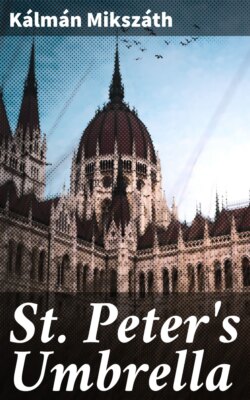Читать книгу St. Peter's Umbrella - Kálmán Mikszáth - Страница 7
На сайте Литреса книга снята с продажи.
CHAPTER II.
GLOGOVA AS IT USED TO BE.
ОглавлениеTable of Contents
Not only the worthy Kapiczány had seen Glogova, the writer of these pages has also been there. It is a miserable little place in a narrow valley between bare mountains. There is not a decent road for miles around, much less a railway. Nowadays they say there is some sort of an old-fashioned engine, with a carriage or two attached, which plies between Besztercebánya and Selmeczbánya, but even that does not pass near to Glogova. It will take at least five hundred years to bring it up to that pitch of civilization other villages have reached.
The soil is poor, a sort of clay, and very little will grow there except oats and potatoes, and even these have to be coaxed from the ground. A soil like that cannot be spoken of as "Mother Earth," it is more like "Mother-in-law Earth." It is full of pebbles, and has broad cracks here and there, on the borders of which a kind of whitish weed grows, called by the peasants "orphans' hair." Is the soil too old? Why, it cannot be older than any other soil, but its strength has been used up more rapidly. Down below in the plain they have been growing nothing but grass for about a thousand years, but up here enormous oak-trees used to grow; so it is no wonder that the soil has lost its strength. Poverty and misery are to be found here, and yet a certain feeling of romance takes possession of one at the sight of it. The ugly peasant huts seem only to heighten the beauty of the enormous rocks which rise above us. It would be a sin to build castles there, which, with their ugly modern towers, would hide those wild-looking rocks.
The perfume of the elder and juniper fills the air, but there are no other flowers, except here and there in one of the tiny gardens, a mallow, which a barefooted, fair-haired Slovak girl tends, and waters from a broken jug. I see the little village before me, as it was in 1873, when I was there last; I see its small houses, the tiny gardens sown partly with clover, partly with maize, with here and there a plum-tree, its branches supported by props. For the fruit-trees at least did their duty, as though they had decided to make up to the poor Slovaks for the poverty of their harvest.
When I was there the priest had just died, and we had to take an inventory of his possessions. There was nothing worth speaking of, a few bits of furniture, old and well worn, and a few shabby cassocks. But the villagers were sorry to lose the old priest.
"He was a good man," they said, "but he had no idea of economy, though, after all, he had not very much to economize with."
"Why don't you pay your priest better?" we asked. And a big burly peasant answered:
"The priest is not our servant, but the servant of God, and every master must pay his own servant."
After making the inventory, and while the coachman was harnessing the horses, we walked across the road to have a look at the school, for my companion was very fond of posing as a patron of learning.
The schoolhouse was small and low, with a simple, thatched roof. Only the church had a wooden roof, but even the House of God was very simply built, and there was no tower to it, only a small belfry at one side.
The schoolmaster was waiting for us. If I remember rightly his name was György Majzik. He was a strong, robust-looking man, with an interesting, intelligent face, and a plain, straightforward way of speaking which immediately awoke a feeling of friendship in one. He took us in to see the children; the girls sat on one side, the boys on the other, all as tidy and clean as possible. They rose on our entrance, and in a singing voice said:
"Vitajtye panyi, vitajtye!" (Good-morning, honored sirs!)
My companion put a few questions to the rosy, round-faced children, who stared at us with their large brown eyes. They all had brown eyes. The questions were, of course, not difficult, but they caused the children an amount of serious thinking. However, my friend was indulgent, and he only patted the schoolmaster on the back and said:
"I am quite contented with their answers, my friend."
The schoolmaster bowed, then, with his head held high, he accompanied us out to the road.
